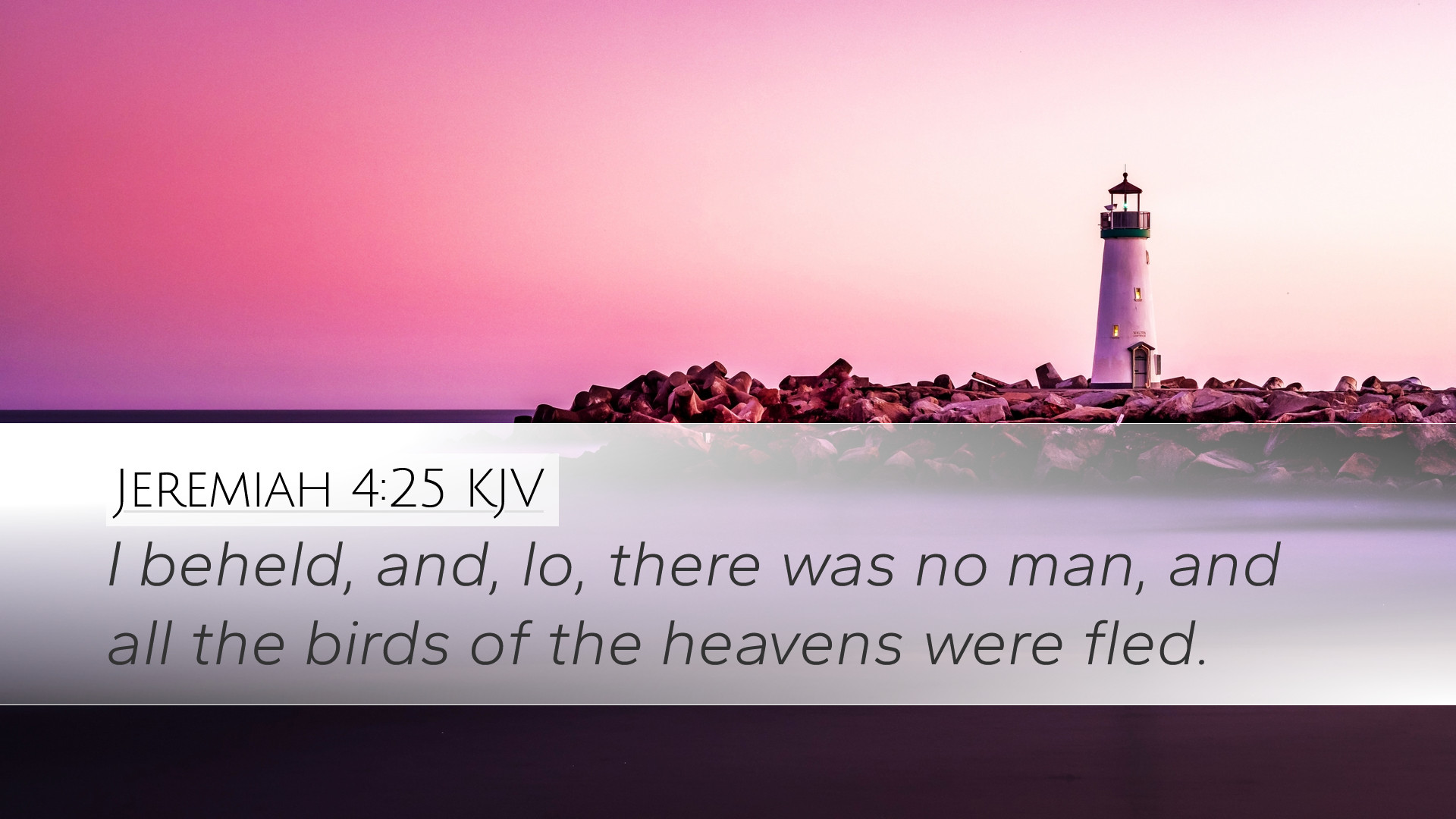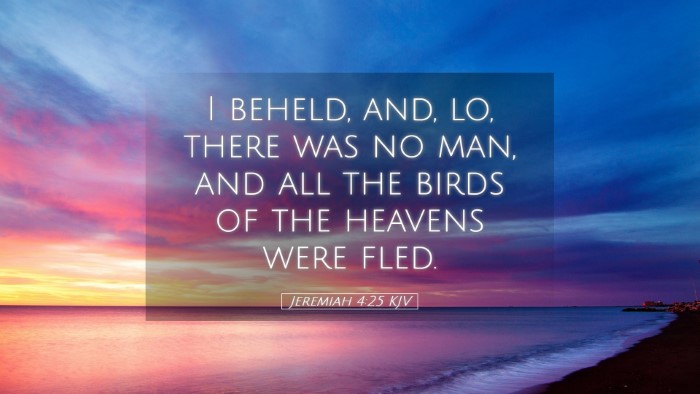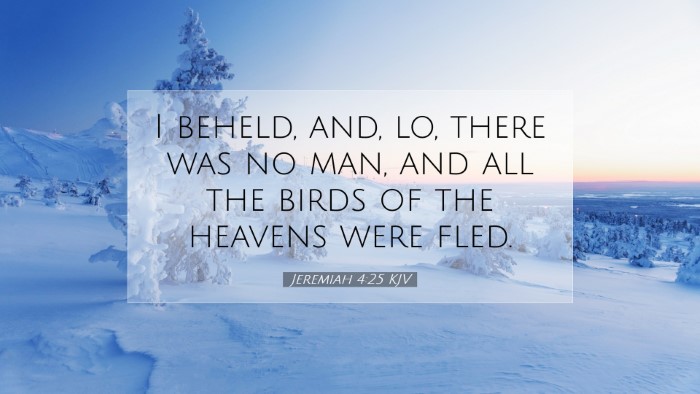Commentary on Jeremiah 4:25
Verse Reference: Jeremiah 4:25 - "I beheld, and, lo, there was no man, and all the birds of the heavens were fled."
Introduction
This passage from Jeremiah serves as a profound insight into the desolation and judgment that befalls a land distanced from God. In this commentary, we will explore the implications of this verse based on insights from esteemed public domain commentators such as Matthew Henry, Albert Barnes, and Adam Clarke. Each commentator provides a unique perspective that sheds light on the gravity of the situation depicted in this verse.
Contextual Background
Jeremiah, known as the Weeping Prophet, was called to deliver God’s message during a tumultuous period in Israel’s history. The nation faced impending judgment due to their persistent sin and rebellion against God. In chapter 4, Jeremiah’s prophetic vision reveals the catastrophic consequences of the nation’s choices, portraying a landscape that is stark and void.
Insights from Matthew Henry
Matthew Henry emphasizes the lamentation over the state of the land. He notes that the absence of man signifies a complete desolation. In his view, the phrase "no man" indicates that not only is there a physical absence of humanity, but also a spiritual barrenness has taken root due to sin. Henry remarks:
"When people forsake God, He forsakes them; then all life and usefulness is gone."
This absence of man suggests a divine judgment where human responsibility and presence are rendered meaningless. Further, Henry relates the fleeing birds to a natural response to danger, symbolizing that even creation itself recognizes the devastation and departs from it. This highlights the profound impact of human sin that causes disarray in the entire creation.
Reflections from Albert Barnes
Albert Barnes deepens the understanding of this verse by illustrating the metaphorical significance of "no man" and "the birds of the heavens." Barnes interprets the phrase as an image of utter desolation and abandonment. He posits that:
"The total absence of the inhabitants was a sign of the great calamity that had come upon the land."
Barnes underscores that the land devoid of life reflects not only the physical consequences but also the spiritual ramifications. He suggests that mankind's departure indicates a retreat from God’s protection and blessing. The birds, often regarded as symbols of freedom and life, being absent speaks to the broader theme of God’s creation responding to sin with judgment. Additionally, Barnes connects this state of desolation to the prophetic warnings God delivered through Jeremiah, emphasizing the inevitability of judgment when people reject divine guidance.
Adam Clarke's Interpretation
Adam Clarke provides a nuanced examination of this text, focusing on the implications of God’s judgment. He points out that the emptiness of the land is a direct result of sin and rebellion against God. Clarke notes:
"The absence of man's presence and the flight of the birds signify the utter ruin of a nation that has forgotten its God."
Clarke elaborates on the notion that, in such desolation, divine wrath has emerged as a consequence of persistent iniquity. He urges readers to reflect on the stark reality of choosing to forsake God, warning that the repercussions extend beyond physical devastation to spiritual death. Clarke encourages believers to recognize the seriousness of turning away from God and the impact this shift has not only on individuals but on society and creation as a whole.
Theological Implications
This verse serves as a sobering reminder of the consequences of sin. The absence of man and fleeing birds are more than mere imagery; they are stark representations of what occurs when humanity turns its back on God. The silence of the land and the lack of life reveal a reality that theologians and spiritual leaders must confront: God's judgment is real, and the departure from divine principles results in desolation.
Call to Reflection and Action
For theologians and pastors, Jeremiah 4:25 challenges leaders to guide their congregations towards a deeper understanding of repentance and the necessity of remaining close to God. The imagery used by Jeremiah serves both as a warning and a call to restoration. It reminds us that:
- Sin leads to separation from God: Just as the land became desolate due to the people's disobedience, so too can any heart become barren when it forsakes divine truth.
- Creation responds to Divine Presence: The fleeing of birds symbolizes that even nature reflects God's order and disarray that follows human rebellion.
- God's mercy always beckons return: Despite the desolation, there remains hope in repentance and a return to God’s ways, which can restore not just individuals but entire communities.
Conclusion
Jeremiah 4:25 encapsulates a profound statement on the reality of divine judgment and human responsibility. As theologians and spiritual leaders study this verse, they are reminded of the critical importance of living in obedience to God and nurturing a relationship that reflects His grace and truth. In the desolation described, there exists a poignant allegory for the modern church and society, urging all to seek restoration through genuine repentance and reliance on God.


